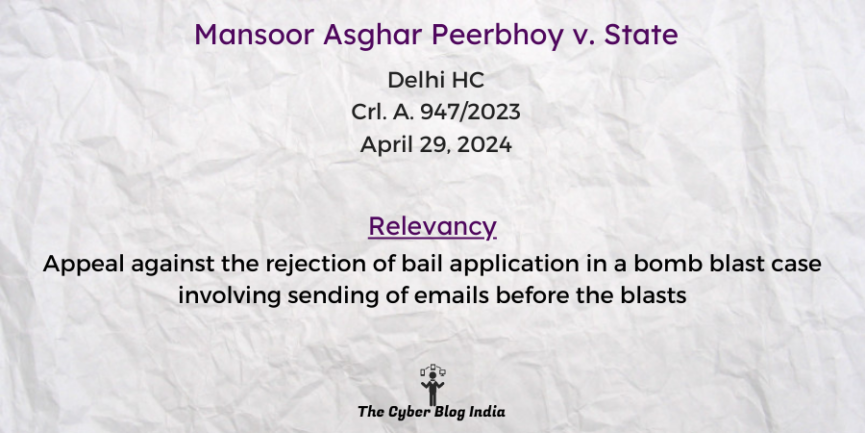Mansoor Asghar Peerbhoy v. State

Mansoor Asghar Peerbhoy v. State
In the High Court of Delhi
Crl. A. 947/2023
Before Justice Suresh Kumar Kait and Justice Manoj Jain
Decided on April 29, 2024
Relevancy of the case: Appeal against the rejection of bail application in a bomb blast case involving sending of emails before the blasts
Statutes and Provisions Involved
- The Information Technology Act, 2000 (Section 66)
- The National Investigation Agency Act, 2008 (Section 21)
- The Indian Penal Code, 1860 (Section 121, 307, 323, 295A, 505, 120B, 121, 122, 286, 499)
- The Code of Criminal Procedure, 1973 (Section 439)
- The Unlawful Activities (Prevention) Act, 1967 (Section 10, 13, 43D)
- The Explosive Substances Act, 1908 (Section 3, 4, 5)
- The Explosive Act, 1884 (Section 6, 9B)
- The Arms Act, 1959 (Section 2, 25)
- The Maharashtra Control of Organised Crime Act, 1999 (Section 3)
Relevant Facts of the Case
- The police conducted a raid in Delhi concerning the serial blasts in the state on September 13, 2008. The accused, Mohd. Saif revealed the existence of a ‘Media Group’ involved in sending emails before the blasts.
- The appellant sent an email on the day of the bomb blast, which was revealed by the investigation. The Mumbai police arrested him and recovered laptops, a Wi-Fi hotspot finder, a Radio Frequency signal detector, and other paraphernalia used to send the email. The appellant had purchased one of those laptops, which solidified his involvement.
- Further, Asir Bashir Shaikh, a co-conspirator, assigned him to send the emails in Pune. The appellant and co-accused Mubin Khadar Shaikh also attended a course on ethical hacking, including Wi-Fi hacking.
- In a supplementary chargesheet, the police alleged that he travelled to Mumbai on June 06, 2009, with the other co-accused, strengthening the case against him.
- The Special Court denied the applicant’s first bail application in 2015 and the second in 2022. He has challenged the order in the present appeal.
Prominent Arguments by the Advocates
- The petitioner’s counsel argued that the only scientific evidence available is the CFSL report, which established the dispatch of the email. However, it does not prove that the petitioner sent the email. Further, the trial court relied on the testimony of PW-226 regarding the use of secure disk-wiping software as he is not an expert, which was, according to him, falsified, as revealed by PW-207’s conduct in cross-examination. The counsel claimed that the appellant has suffered 13 years in jail due to undue delay in the trial.
- The respondent’s counsel submitted that the nature of the offence is severe. The Special Court has been conducting the trial every Saturday to conclude the trial.
Opinion of the Bench
- The court examined the Union of India v. K.A. Najeeb case, in which bail was granted on a constitutional basis, irrespective of the statutory bar under Section 45D of UAPA. It held that the facts of the case were different. There is no such infringement of fundamental rights in this case.
- The Special Court has been conducting trials every Saturday and is soon reaching completion. Hence, the delay in trial is not a factor in granting bail in this case.
Final Decision
- The bench rejected the bail application and ordered the Special Court to conduct the trial twice a week.
